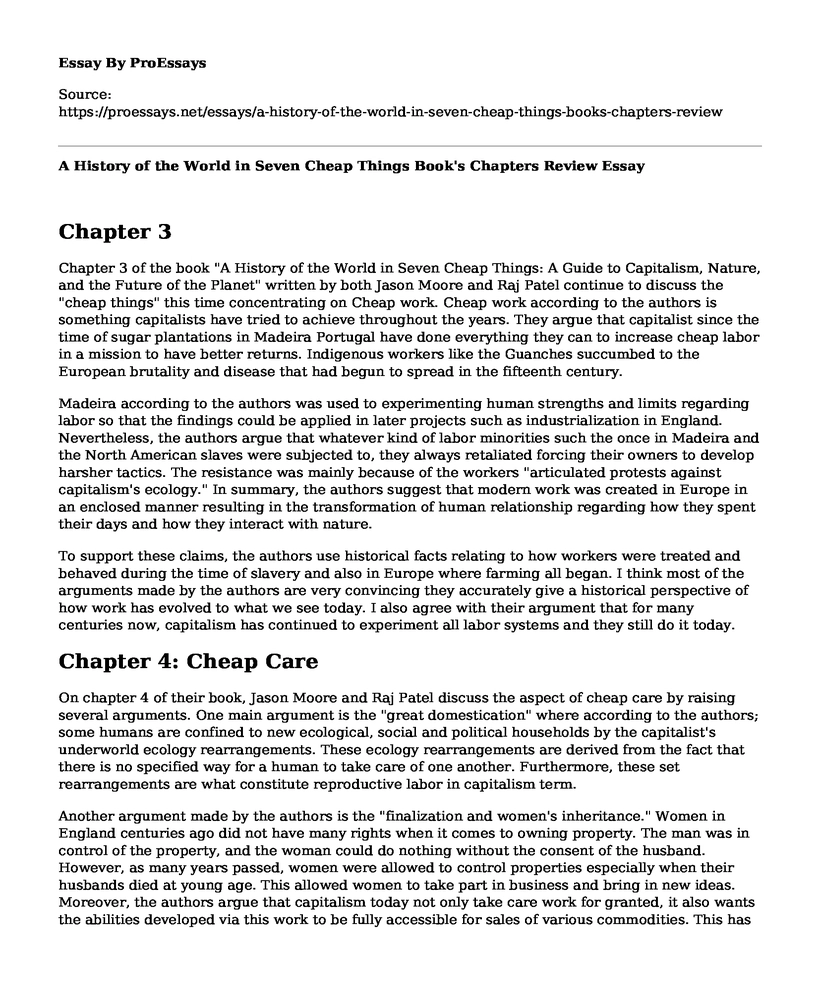Chapter 3
Chapter 3 of the book "A History of the World in Seven Cheap Things: A Guide to Capitalism, Nature, and the Future of the Planet" written by both Jason Moore and Raj Patel continue to discuss the "cheap things" this time concentrating on Cheap work. Cheap work according to the authors is something capitalists have tried to achieve throughout the years. They argue that capitalist since the time of sugar plantations in Madeira Portugal have done everything they can to increase cheap labor in a mission to have better returns. Indigenous workers like the Guanches succumbed to the European brutality and disease that had begun to spread in the fifteenth century.
Madeira according to the authors was used to experimenting human strengths and limits regarding labor so that the findings could be applied in later projects such as industrialization in England. Nevertheless, the authors argue that whatever kind of labor minorities such the once in Madeira and the North American slaves were subjected to, they always retaliated forcing their owners to develop harsher tactics. The resistance was mainly because of the workers "articulated protests against capitalism's ecology." In summary, the authors suggest that modern work was created in Europe in an enclosed manner resulting in the transformation of human relationship regarding how they spent their days and how they interact with nature.
To support these claims, the authors use historical facts relating to how workers were treated and behaved during the time of slavery and also in Europe where farming all began. I think most of the arguments made by the authors are very convincing they accurately give a historical perspective of how work has evolved to what we see today. I also agree with their argument that for many centuries now, capitalism has continued to experiment all labor systems and they still do it today.
Chapter 4: Cheap Care
On chapter 4 of their book, Jason Moore and Raj Patel discuss the aspect of cheap care by raising several arguments. One main argument is the "great domestication" where according to the authors; some humans are confined to new ecological, social and political households by the capitalist's underworld ecology rearrangements. These ecology rearrangements are derived from the fact that there is no specified way for a human to take care of one another. Furthermore, these set rearrangements are what constitute reproductive labor in capitalism term.
Another argument made by the authors is the "finalization and women's inheritance." Women in England centuries ago did not have many rights when it comes to owning property. The man was in control of the property, and the woman could do nothing without the consent of the husband. However, as many years passed, women were allowed to control properties especially when their husbands died at young age. This allowed women to take part in business and bring in new ideas. Moreover, the authors argue that capitalism today not only take care work for granted, it also wants the abilities developed via this work to be fully accessible for sales of various commodities. This has contributed to women being cheapened due to their supportive and caring attitude. To support these arguments, the authors use various facts like comparing housework hours for men and women to highlight the difference that exists between them. I found most of the arguments about this chapter to be valid and convincing. This is because it correctly highlights how the roles of women have improved over the years and also how much they have not been appreciated for their contribution.
Cite this page
A History of the World in Seven Cheap Things Book's Chapters Review. (2022, Apr 14). Retrieved from https://proessays.net/essays/a-history-of-the-world-in-seven-cheap-things-books-chapters-review
If you are the original author of this essay and no longer wish to have it published on the ProEssays website, please click below to request its removal:
- Ancient Egyptian-Byzantine Empire
- Essay Sample on Identity Pursuit in the Gilgamesh Mythological Story
- Essay on Daenerys Targaryen: A Machiavellian Leader Approved by Niccolo Machiavelli?
- Poetry Analysis Essay on We Real Cool: Exploring Gwendolyn Brooks' Poem from 1959
- Myths: Perseus, Zeus and Danae - Essay Sample
- Uncle Tom's Cabin: African American Representation in 19th Century - Essay Sample
- Essay on Ennio Morricone's Final Performance: 90-Year-Old Musician Retires in London







